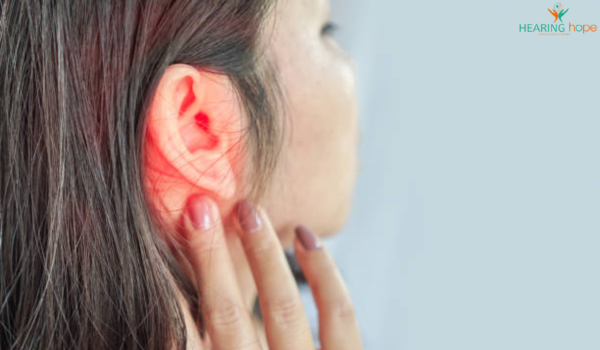
Hot Ears: Causes, Symptoms, and Solutions
Have you ever wondered, “Why are my ears getting hot?” This curious sensation can range from a harmless response to external factors to a sign of an underlying medical condition. Whether it’s a fleeting feeling or a recurrent issue, understanding the causes and solutions for hot ears can help you manage the condition effectively. In this comprehensive guide, we’ll explore the potential causes of hot ears, related symptoms, and when to consult a healthcare professional. Additionally, we’ll share practical remedies and prevention tips to ensure your ears stay healthy and comfortable.
Why Ears Become Hot?
Hot ears refer to a sensation of warmth or burning, often paired with redness in one or both ears. While this condition is typically harmless, persistent or severe cases may point to a health concern.
Types of Hot Ear Sensations
- Transient Flushing: Temporary redness caused by emotional or temperature changes.
- Localized Heat: Persistent warmth due to conditions like infections.
- Symptomatic Redness: Redness combined with pain, swelling, or itching.
Common Causes of Hot and Red Ears
The reasons behind hot ears vary, ranging from lifestyle factors to medical conditions. Let’s take a look at the most common causes:
Environmental Factors:
- Sunburn: Overexposure to UV rays can cause redness and a burning sensation.
- Example: Spending a day at the beach without sunscreen.
- Cold Weather Exposure: Extremely cold temperatures can irritate sensitive skin, causing redness when moving indoors.
Emotional Triggers:
- Stress and Anxiety: These emotions can cause blood vessels to dilate, leading to flushed ears.
- Example: Feeling nervous before a public speaking event.
- Embarrassment: Blushing often extends to the ears, especially in social settings.
Medical Conditions:
- Infections: Otitis externa (outer ear infection) or otitis media (middle ear infection) can lead to hot, swollen ears.
- Allergic Reactions: Contact dermatitis from earrings or headphones can trigger redness and warmth in the ear.
Hormonal Changes:
- Menopause: Hot flashes often include warm ears as a symptom.
- Example: Women experiencing menopausal symptoms may report recurring ear warmth.
- Hormonal Imbalances in Men: Changes in testosterone levels can also result in hot ears.
Other Causes:
- Ear Trauma: Physical injury can cause temporary redness.
- High Blood Pressure: Sudden spikes in blood pressure may cause flushing of the face and ears.
Hot Ear Symptoms to Watch For
Identifying the symptoms that accompany hot ears can help determine whether medical attention is needed. Here are some common symptoms to monitor:
Mild Symptoms:
- A warm or tingling sensation.
- Temporary redness without pain.
Moderate Symptoms:
- Persistent redness and swelling.
- Itching or rashes around the ear.
- Slight discomfort or sensitivity to touch.
Severe Symptoms:
- Sharp pain or throbbing.
- Fever or dizziness.
- Ear discharge or hearing loss.
If you experience any of these severe symptoms, it’s time to schedule a hearing test in Delhi.
When to Seek Medical Attention?
While most cases of hot ears are harmless and resolve naturally, certain symptoms may indicate an underlying issue that requires professional care. Seek medical attention if:
- Persistent Redness and Warmth: If the heat and redness persist for more than a week without improvement, it could signal an infection, inflammation, or another underlying condition.
- Pain, Fever, or Fluid Discharge: Sharp pain, fever, or fluid leaking from the ear canal may suggest an ear infection or a more serious issue like a ruptured eardrum. These symptoms should be addressed promptly to prevent further complications.
- Hearing Loss: If hot ear symptoms are accompanied by partial or complete hearing loss, this could indicate an issue with the auditory system, such as inner ear inflammation or nerve damage.
- Swelling or Noticeable Changes in Ear Shape: If your ear swells, changes shape, or you notice lumps, this could indicate physical trauma, a severe allergic reaction, or a growth that requires a medical examination.
- Difficulty Balancing or Dizziness: If hot ears are combined with dizziness or loss of balance, this may point to an inner ear issue like labyrinthitis. Prompt care is necessary to avoid complications.
Read Also: Earache and Headache
Why Seeking Medical Attention is Important
Ignoring symptoms like persistent ear heat or pain can lead to severe complications such as chronic infections, permanent hearing loss, or the spread of infection to other parts of the body. Timely diagnosis ensures the underlying cause is addressed and treated appropriately, protecting both your hearing and overall health.
Practical Home Remedies for Hot Ears
For mild cases of hot ears, you can use these simple remedies:
Cooling Techniques:
- Cold Compress: Wrap ice in a cloth and apply it to the affected area for 10 minutes.
- Aloe Vera Gel: Use chilled aloe vera to soothe sunburned ears.
Stress Management:
- Meditation and Yoga: These techniques help reduce stress-induced flushing.
- Deep Breathing Exercises: Calming the mind can help prevent ear redness caused by anxiety.
Moisturizers and Lotions:
- Use hypoallergenic creams to hydrate dry or irritated skin.
Over-the-Counter Solutions:
- Antihistamines: Effective for allergies causing red, itchy ears.
- Topical Antibiotics: Helpful for minor cuts or infections.
Medical Treatments for Persistent Hot Ears
If home remedies don’t work, medical treatments may be necessary:
- Antibiotics: Prescribed for bacterial infections.
- Steroid Creams: Reduce inflammation caused by conditions like dermatitis.
For hearing-related issues, visit Hearing Care Solution in Delhi to explore tailored treatments.
Preventive Measures for Healthy Ears
- Apply Sunscreen: Protect your ears from sun damage by applying sunscreen with SPF before going outdoors. Focus on often-overlooked areas, like the tips and edges of your ears, to avoid burns and irritation.
- Limit Stress: Stress levels can contribute to ear heat. Include stress-relieving activities such as deep breathing, yoga, or meditation in your daily routine to maintain overall ear health.
- Stay Hydrated: Proper hydration ensures your skin, including around the ears, stays healthy and moisturized.
- Clean Your Ears Gently: Avoid inserting sharp objects into your ear canal. Use a soft cloth to clean your outer ear, and consult a professional for wax removal to prevent irritation or infection.
A Comparison of Common Causes and Symptoms
Cause | Symptoms | Remedies |
Sunburn | Redness, peeling skin | Apply aloe vera, use sunscreen |
Infections | Pain, swelling, fever | Seek antibiotics |
Emotional Triggers | Flushing, warmth | Practice stress management |
Allergies | Itching, redness | Use antihistamines |
Hormonal Changes | Intermittent warmth | Hormonal therapy, if severe |
Also Read: How to Remove Water From Ear
Conclusion
Hot ears are often a minor and temporary issue, but they can sometimes indicate a deeper health concern. By understanding the causes, symptoms, and remedies, you can manage the condition effectively. If symptoms persist or worsen, seeking professional help is essential. Schedule a hearing test in Delhi or explore Hearing Care solutions in Delhi for expert guidance.
Frequently Asked Questions
Hot and red ears can result from sunburn, emotional triggers such as stress or embarrassment, hormonal changes, or medical conditions like infections or allergies.
Common symptoms include warmth, redness, swelling, itching, and, in some cases, pain, fever, or ear discharge. Severe symptoms may indicate an underlying medical condition.
Consult a doctor if your ears remain hot and red for more than a week, are accompanied by severe pain, fever, or hearing loss, or if there’s fluid discharge from the ear.
Effective home remedies include applying a cold compress, using aloe vera for sunburn, managing stress with relaxation techniques, and using over-the-counter antihistamines for allergies.
Prevention tips include applying sunscreen to your ears, reducing stress, staying hydrated, avoiding allergens, and practicing gentle ear hygiene to prevent irritation or infections.
Dr. Harshi, is an accomplished Audiologist with extensive expertise in treating individuals with hearing impairments.

